Dental Implants
Dentistry’s Best Answer for Tooth Loss
Patients who are missing any number of teeth have a strong, beautiful alternative to bridges, partials, or full dentures. Dental implants mimic the roots to create a more natural tooth replacement option that will improve your smile and your lifestyle. They look, feel, and function like natural teeth because they create a titanium anchor, mimicking tooth roots and attaching to the jawbone. Implants can anchor dental crowns, bridges, partials, or full dentures to eliminate slipping. Call the dental team at East Islip Dental Care to find out more or schedule a dental implant consultation. We’ll evaluate your smile and help you determine whether or not dental implants are the right tooth replacement solution for your unique smile.
Why Choose East Islip Dental Care for Dental Implants?
- Implant placement & restoration provided under one roof
- Able to replace any number of teeth for a lifetime
- 98% success rate
What Are Dental Implants?
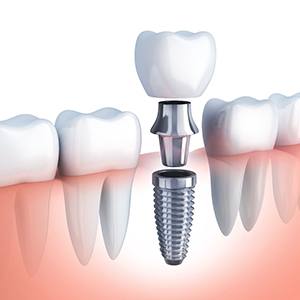
A dental implant is a small post, usually made of a titanium alloy, that we are able to place beneath your gumline and directly into your jawbone, in the place where the root of your tooth once was. During the few months following your surgery, your jawbone actually grows around the implant in a remarkable process called osseointegration. Once this process is complete, the implant is essentially a part of your own anatomy.
The 4-Step Dental Implant Process

Dental implants are becoming one of the most popular tooth replacement options because of their unique health and aesthetic benefits. We can use dental implants to replace one tooth, multiple teeth, or even entire smiles. Unlike most dentists who have to send you to a specialist for implants, we can place and restore them all at the same convenient location. But how do dental implants work? How can they provide so many benefits? The answer lies in the procedure itself. Read on to learn how we place dental implants for a strong, secure, and beautiful smile.
Initial Dental Implant Consultation
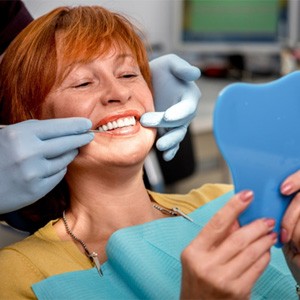
Typically, you’ll go to a dentist’s office for a consultation, where they will refer you to a specialist for your implant placement. At East Islip Dental Care, we have a highly trained and experienced team ready to provide you with start-to-finish quality and convenience. First, we will examine your smile before developing a personalized treatment plan.
Dental Implant Surgery
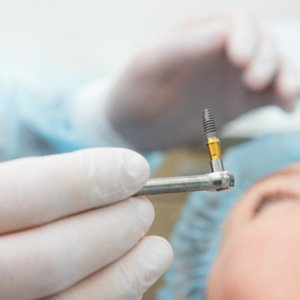
Once your surgery is scheduled, you’ll come into our office, and we’ll ensure that you’re numb and comfortable. Then, we will make small incisions in your gums to access your jawbone. Next, we’ll create small holes in your jaw to accommodate your implants. Once they’re placed, we will provide you with a temporary restoration to maintain your appearance.
Dental Implant Osseointegration & Abutment Placement
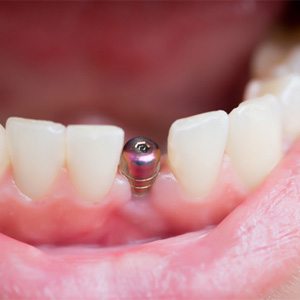
The next step requires you to wait at least 3 to 4 months for your dental implants to heal. This process is called osseointegration, which fuses the implants to your jawbone for strong and permanent support.
Delivery of Dental Implant Restorations

Once your dental implants are completely healed, all you have to do is come back into our office for your custom-made restorations. We’ll mount them on top of your implants to complete your smile. The results are a strong and beautiful set of teeth that look, feel, and function just like your natural ones.
Benefits of Dental Implants

The benefits of dental implants cannot be matched by any other tooth replacement solution on the market. Dr. Rosenfeld and his team of experts are pleased to provide a method of treatment that not only lasts a lifetime with proper care but effectively restores the tooth structure from the root to the crown. As a result, you can experience greater oral health and preserve more of your jawbone over time. This fact alone is one of the many reasons more than 5 million dental implants are placed each year according to the American Dental Association (ADA).
To learn more about the outstanding advantages that come with dental benefits, check out the list below:
Day-to-Day

- If you’ve ever worn dentures, you’ve probably had them slip out of place before. It can be embarrassing and discourage you from eating or talking in front of others. But with implants, your speech will improve due to the additional stability of the restoration.
- With dental implants, you’ll never need to worry about slippage while eating because your implants are secured to your jawbone. Instead of applying dental adhesive as you would with dentures, you can freely eat the foods you love (even those that have hard textures) because of your increased bite force and chewing power.
- You will also discover that with dental implants you can enjoy better oral health because you can easily brush and floss like you do your normal teeth. There is no additional time spent soaking or brushing your prosthetic. Instead, you simply maintain your regular oral hygiene routine.
- If you want greater confidence, you cannot go wrong with dental implants. Their ability to look and feel like natural teeth can give you the courage to socialize with family, friends, and colleagues and be unembarrassed by your smile. Denture-wearers often admit to forgoing social gatherings because of the potential embarrassment they might face as a result of a slipping denture.
Health Benefits

- By being anchored in the jawbone and placed by a qualified implant dentist, implants keep the bone stimulated and strong when it otherwise would diminish and shrink over time.
- Your dental implants can help to extend your lifespan and reduce your risk for many of the most common oral health problems, including diabetes, osteoporosis, and cardiovascular disease.
- You will keep more of your natural, healthy tooth structures by avoiding fixed bridges because your implants don’t require altering nearby, natural teeth.
- You’ll be unlikely to develop oral sores as a result of your dental implants because they fit firmly in place and do not require adjustments or replacements over time. Dentures can be ill-fitting when the jaw begins to narrow, causing problems to occur with your soft oral tissues. However, dental implants remain in their fixed position all the time.
Long-Term Benefits

- Every few years, traditional dentures and bridges need to be adjusted or replaced altogether, adding to your cost of treatment. Not to mention, they require dental adhesives to remain in place and special cleaning supplied. On the other hand, dental implants can last for 30 years or even longer! As a result, although more expensive upfront than other options, dental implants could actually save you money in the long run.
- When initially placed by a skilled implant dentist, dental implants have a success rate of 98%.
- After 10 years, the success rate of dental implants is 90-95%, so it is proven effective at maintaining its permanency for much longer than traditional dentures or fixed bridges.
Who Dental Implants Can Help

If you’re missing just one tooth, it can be hard to find the motivation to replace it, especially if it’s in the back of your mouth where no one will notice. However, even a single missing tooth can lead to severe oral health consequences. Your jawbone will begin to deteriorate in the area that once supported your tooth. Your other teeth will shift to try and fill in the gap, resulting in bite problems and possibly pain. You might even experience further tooth loss.
That’s why our dentists can use dental implants to restore the missing piece of your smile. While this treatment method is not right for everyone, we can seamlessly bring back your smile’s full potential and prevent dental problems down the road.
Who Is a Good Candidate for Dental Implants?

No treatment is right for every patient. However, if you meet the following qualifications, you may be a good candidate for dental implant restoration:
- Missing one or more teeth
- Relatively good overall health
- Adequate jawbone density and gum tissue volume to support implants
- Willing to invest the time and money in this advanced reconstructive option
Missing 1 Tooth
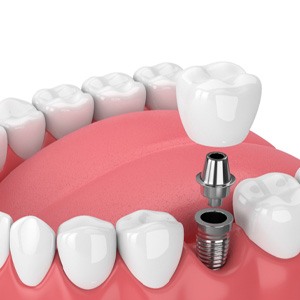
A dental bridge consists of two crowns that are placed over your remaining teeth at either end of the smile in your smile. These crowns are attached to an artificial tooth that literally “bridges” the gap. Bridges have been a popular choice to replace a missing tooth because they are a reliable as well as relatively quick and affordable treatment. In addition, a dental crown anchored to an implant can be used to replace one tooth.
Missing Multiple Teeth
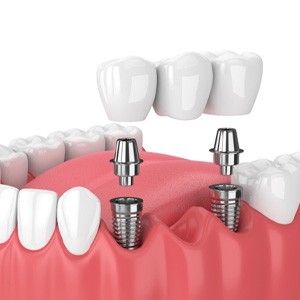
To replace several consecutive or nonconsecutive teeth, a partial denture is created to fit between remaining healthy teeth and supported by two to four implant posts.
Missing All Teeth
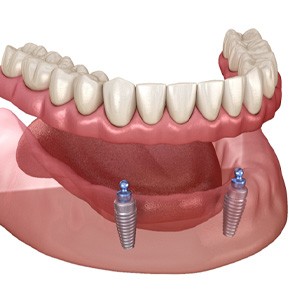
To replace an entire arch of teeth, a full denture can be anchored to four to six implant posts.
All-on-4 Dental Implants

Dental implants are a preferred solution for replacing missing teeth. Why? Because it is a versatile treatment that can replace one, multiple, or even all your teeth! With All-On-4 implants, we can replace an entire arch of teeth using 4 implant posts that are anchored into your jawbone and a customized denture, giving you a beautiful, seamless smile.
Implant Dentures

If you’re missing multiple teeth, you may think that dental implants are beyond your reach. Think again! Even if you’ve lost all of your teeth, dental implants can help you regain your smile’s full function, strength, and beauty. Instead of replacing each individual tooth, we can place four to six posts strategically in the arch and attach your dentures to this solid foundation. That way, you don’t have to endure those awkward situations when dentures can slip.
Understanding the Cost of Dental Implants

Dental implants are considered to be one of the most versatile treatments in dentistry, outside of dental crowns. For one, dental implants are ideal for replacing any number of teeth, regardless of how extensive your tooth loss may be. However, because every patient has their own unique needs, providing an exact cost cannot be done until you’ve had a detailed consultation with one of our dentists. At that point, we can give you a clear estimate and discuss the financial details.
Preliminary Treatments & Dental Implant Surgery

Having successful dental implants can start even before the main treatment has occurred. If you need preparatory procedures to make treatment possible, including periodontal therapy to treat gum disease or bone grafts to expand your current jawbone volume, the overall costs will be higher. The cost of the actual placement procedure may also vary depending on the number and location of the posts. The more implants you’re getting, the more the total will be.
The Parts of Your Dental Implant

As with products in other industries, dental implant parts can have different prices based on the brand. Depending on your needs, we’ll select brands that are best suited for your smile. For instance, for replacing a molar, you’ll want a post to be particularly robust because it will be grinding up your food and experiencing immense force. The abutment, which can differ depending on the type of restoration, also contributes to the overall cost of implant treatment.
Final Dental Implant Restoration

Another important part of calculating the cost of dental implants is the restoration. As you might expect, the more teeth you replace, the more the restoration will cost. For instance, a full implant denture is going to cost more than an implant-retained bridge. Before we begin treatment in our office, we’ll review your smile’s needs, create a personalized plan, and discuss each detail with you so that you know exactly what to expect from beginning to end.
Does My Dental Insurance Cover Dental Implants?

Unfortunately, the dental implants themselves are not typically covered by dental insurance. However, that doesn’t mean certain preparatory treatments cannot receive partial coverage. Most dental insurance cover a portion of the cost of gum therapy to stop the development of infected gum tissue or initial consultations to discuss plans for your care. Our team is experienced in finding ways to save our patients as much as possible, and we’ll take a closer look at your policy when you come for your consultation.
Making Dental Implants Affordable

Don’t have dental insurance benefits? Our office provides an in-house dental plan that not only includes routine preventive care but also gives you a 20 percent discount on most other procedures. With or without insurance or this plan, you can pay for your procedure in monthly installments, rather than upfront with our financing program from Wells Fargo, which makes paying for your treatment easier.
Advanced Dental Implant Procedures

The jawbone starts to break down once the teeth that provide it with stimulation are gone. If you’ve been living with a gap in your smile for a while, odds are you’ve already suffered from bone loss. Unfortunately, inadequate jawbone density can sometimes stop you from getting implants – but it doesn’t have to! Contact East Islip Dental Care today to schedule a dental implant consultation and learn about advanced procedures that might let you get implants even after your jaw has started to deteriorate.
Bone Grafting

Bone grafting is meant to help diseased or damaged bones repair and rebuild themselves. We can use it to give your jaw the extra height it needs to support dental implants.
During the procedure, grafting material is placed in your jaw for the living cells in the bone to bond to, allowing it to regenerate. The kind of material depends on the type of bone graft you’re getting. Autografts are one of the most common kinds; they use bone tissue from another part of the body, such as the hips. Allografts will use bone from a human donor, xenografts take the bone from an animal source, and alloplastic grafts use synthetic material. We’ll select the kind of graft that will work best with your specific situation.
Before you get a bone graft, you should let us know everything about your current health (for example, any medications you’re taking or whether you’ve been sick recently). Some medicines, like those that thin the blood, shouldn’t be used prior to the surgery.
It’ll take several months to fully recover from a bone graft, at which point your dental implants can be placed. During the recovery period, you can use pain medication and ice packs for any discomfort or swelling. You should follow a soft food diet for a while; be sure to avoid chewing with teeth near or at the site of the surgery.
Sinus Lifts

A sinus lift is a lot like bone grafting; it also involves using transplant materials (whether from your own body, a donor, an animal or something synthetic) to encourage deteriorated or damaged bone to repair itself. However, the main difference is that it’s a procedure specifically for the upper jaw; in addition to adding bone height, it can also be used to move the sinuses away from where the implants need to be placed if there isn’t enough room for the posts otherwise.
After making a small incision in your gum tissues, we will gently push the membrane that lines your sinuses up and away from your jaw. This creates an empty space for the grafting material to be placed, adding several millimeters of height. It’ll take about four to nine months for the jaw to fully repair itself; once it does the implant surgery will begin.
If your jaw has started to break down, it doesn’t have to stop you from getting dental implants; call us as soon as possible to figure out what kind of procedure could help you repair your smile!

